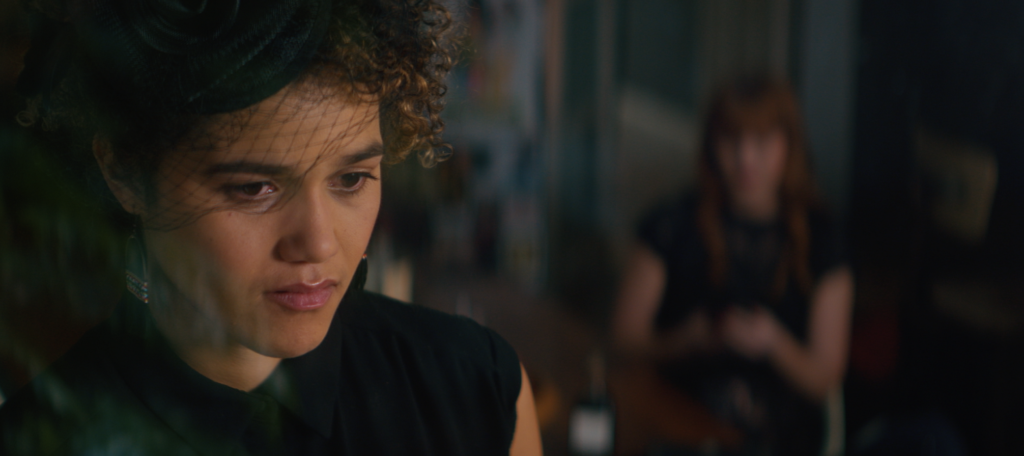Drew V. Marke has written short films which have been selected for international festivals such as Encounters and Sci-Fi London, won a Film London award, and been screened at the David Lean cinema and BAFTA London. She has been selected for various hotlists/schemes such as the British Film Institute Network’s best of the year list, the BBC New Talent hotlist, and the Channel 4 writing fellowship. “Get Luke Lowe” marks her feature debut.
“Get Luke Lowe” will screen at the 2020 American Black Film Festival, which takes place August 21-30.
W&H: Describe the film for us in your own words.
DVM: “Get Luke Lowe” is a dark comedy crime drama about two young women who abduct a far-right online troll in an act of vengeance, but things don’t exactly go as planned. The film deals with social issues such as racism and the effects of internet culture in modern times.
W&H: What drew you to this story?
DVM: The film was inspired by an incident that I had in the UK with someone who had far-right views. He was harassing an older black woman and I stepped in. When I did, I was surprised by the negative racial stereotypes and language that materialized during this encounter — as well as him making misogynistic comments. Then, in the same breath, he denied that he held any racist views.
Based on what he said, he clearly felt very disenfranchised and turned that ire on people like me and the older woman. Regardless, that open display of bigotry is something that I thought belonged to my parents’ and grandparents’ generations, but this is clearly not the case in modern times.
I wanted to depict that onscreen — ensuring that the character he inspired, Luke Lowe, was not simply angry, but rather beguiling, as many modern far-right leaders and public figures tend to be.
Plus, as a fan of dark humor, I wanted to have a little fun with his character and that of the two lead women. I also wanted to talk about the influences that are fueling such discriminatory behavior — namely internet culture, and how all of these displays of bigotry and extremism on the right stoke extremism on the other side too.
Basically, it’s a film that says at the current moment, it’s all a little fucked up.
W&H: What do you want people to think about after they watch the film?
DVM: I don’t want to dictate what people should think after watching this. That’s up to them. Hopefully, they enjoy the ride, though.
W&H: What was the biggest challenge in making the film?
DVM: The budget and tight schedule. We shot the film in 12 days. But otherwise the rest was manageable and a lot of fun!
W&H: How did you get your film funded? Share some insights into how you got the film made.
DVM: We got the film funded through a private financial source.
W&H: What inspired you to become a filmmaker?
DVM: My parents’ love for film: they both had very different and eclectic tastes. Also, one too many trips to Disney World in Florida as a child — I definitely drank the Kool-Aid.
W&H: What’s the best and worst advice you’ve received?
DVM: The best advice that applied to me personally was to make content.
Worst advice: Anything that usually starts with “You can’t do this.” I find it is often others projecting limitations onto you.
W&H: What advice do you have for other female directors?
DVM: Make content. Use whatever resources you have at your disposal regardless of how limited they may be. Above all, don’t wait for others to give you permission to tell your stories.
W&H: Name your favorite woman-directed film and why.
DVM: I have several but one favorite is Sofia Coppola’s “Lost in Translation.” What she managed to capture in terms of a human connection was stunning. For me, every part of that film was perfect.
W&H: How are you adjusting to life during the COVID-19 pandemic? Are you keeping creative, and if so, how?
DVM: It’s been a fertile time in terms of coming up with new ideas, and I have had the time I need to really develop them — which I love! I also made a couple of lockdown shorts.
W&H: Recent protests in the U.S. and abroad have highlighted racism and anti-Black police brutality. The film industry has a long history of underrepresenting people of color onscreen and behind the scenes and reinforcing — and creating — negative stereotypes. What actions do you think need to be taken to make Hollywood and/or the doc world more inclusive?
DVM: I think we’ve definitely been heading in the right direction in the last couple of years or so, so I would say to continue giving more opportunities to diverse writers, directors, and producers — and I mean all types of diversity, including race, gender, sexual orientation, physical ability, etc. — to both create content that both reflects their experience but also content that has nothing to do with their experience, race, gender, sexual orientation, physical ability, etc.







